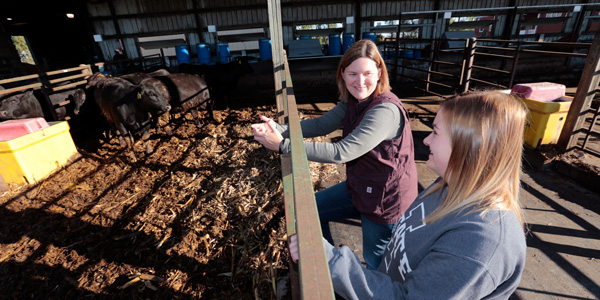
Inspired By Curiosity
Becoming a national expert in ruminant nutrition was not on the radar when Stephanie Hansen arrived at Iowa State as a first-generation college student. She just wanted to learn more about beef cattle.
She started to imagine going to graduate school as her adviser Doug Kenealy (’69 dairy science, ’74 PhD animal science), now retired, kept telling her she’d make a good professor.
Hansen (’02 animal science) took that path, and now as an associate professor of animal science at Iowa State she encourages her students to consider a similar future.
“It’s a great life for someone who’s innately curious. Ask a question and look for the answers. That’s what I get to do in research. At least as long as I can find a way to fund it,” she says.
Hansen grew up in the town of Sergeant Bluff in northwest Iowa, and spent many hours on her grandparents’ farm-to-finish Limousin beef operation nearby. She remembers looking at the cattle through the picture window one day and saying, “Why don’t we do anything with them?” As the oldest grandchild, she had pull: It wasn’t long before the family was loading up cattle for the fair to compete for—and often win—trophies. Along the way, she gained some hard knocks from unpredictable cattle that taught her toughness and persistence. From years in 4-H, she also learned about record-keeping and financial management, setting the stage for her grant-writing and communication skills.
After her undergraduate degree, Hansen went on to North Carolina State University for a master’s and doctorate. She returned to Iowa State in 2009 as an assistant professor of animal science. Her work focuses on the influence of minerals and vitamins on cattle health, stress levels and meat characteristics, improving feed efficiency and assessing novel feedstuffs.
She is one of the only women in the room at many livestock nutrition meetings, something that’s changing fast for the students she teaches and mentors. “Women are increasing the ranks of animal science students at Iowa State, which is also a trend nationally,” says Hansen.
It’s early in her career, but Hansen is already gaining notoriety. She’s authored nearly 60 peer-reviewed articles, and she has garnered about $8.5 million in research funding. Last year, the American Society of Animal Science recognized Hansen with both national and Midwest early career achievement awards.
Solving industry’s hard questions
Her expertise on the role of minerals in animal nutrition is rare. That brings unique opportunities to work with livestock businesses and consultants to build and apply relevant science.
“I get those fun phone calls from people in the industry who have hard questions,” says Hansen. “I really appreciate that they trust me to help solve their problems.”
Currently, she’s studying sulfur in the diets of beef cattle, with implications for utilizing co-products of ethanol production that tend to be high in sulfur. Another project, funded by a U.S. Department of Agriculture grant, aims to bridge the effects of nutrition and meat quality, with colleague Elisabeth Huff- Lonergan, professor of animal science.
Huff-Lonergan (’91 MS meat science, ’95 PhD) is a university-wide leader in recruitment and retention of women and underrepresented minorities. She served as a departmental mentor during Hansen’s early days on campus, but this project is the first time the two have worked together.
“Stephanie is very collaborative and appreciates the value of cross-cutting research,” says Huff-Lonergan. “She’s also quite dedicated to her students. I appreciate the way she guides them, while also giving them freedom to figure things out on their own.”
Teaching livestock nutrition, life lessons
Hansen says participation in Iowa State’s Project LEARN (Learning Enhancement Action/Resource Network) has been invaluable. Offered through the College of Agriculture and Life Sciences with support from the USDA, the program aims to nurture effective, student-centered instruction. Hansen is working with seven graduate students and frequently includes undergraduate researchers in her projects. She likes to give the undergrads opportunities to work with graduate students and learn from each other.
Enrollment in her senior-level nutrition class has doubled in the last two years. Livestock nutrition isn’t the only thing on the syllabus. Students also develop skills like note-taking and synthesizing concepts.
“As an undergraduate student in Dr. Hansen’s advanced nutrition class, it was obvious to me how passionate she was about not only the subject of nutrition but also teaching,” says Erin Deters (’15 animal science), who is pursuing a doctorate with Hansen’s mentorship. “Dr. Hansen’s evident passion for nutrition intensified my interest in the subject and eventually led me to join her lab as a graduate research assistant. She has high expectations and is dedicated to helping students achieve these expectations as well as reach their academic and professional goals.”
Hansen says she wants to help her students become better learners— something she considers important at any stage of college or life. Balance is another life lesson Hansen believes in. She values time outdoors, hiking and enjoying her hobby of photography (her Instagram handle is “@mineralnerd”). She’s also writing her first book, a science thriller.
“I love what I do,” says Hansen, “but, as I tell my students, it’s important to take time away from work to recharge. When I’m not thinking about beef cattle, I try to be on a mountain somewhere.”



